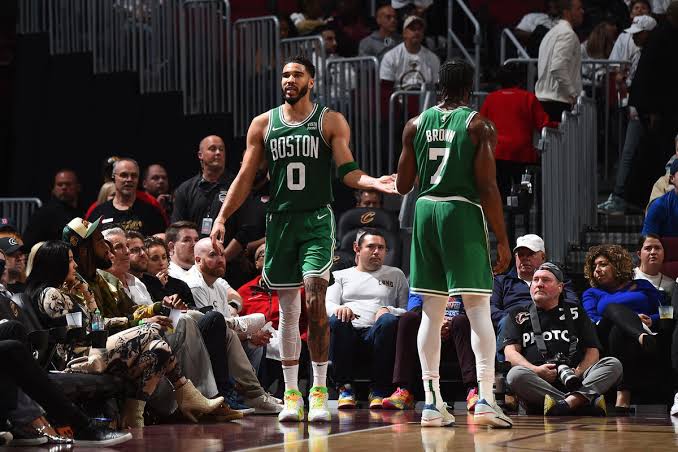There’s been a lot of discussion surrounding Jayson Tatum in the past 72 hours, but none of it really got at what really matters to him.
“Do you think people don’t look at your overall game—your defense, your rebounding, your assists—do you think you’re disrespected in that aspect?” asked the Boston Globe’s Gary Washburn, directly referencing the online discourse that had consumed Boston Celtics media following the Game 2 loss.
Washburn knows that NBA players, specifically those of this generation, cannot possibly avoid online discourse, nor can they totally block out the noise, judgements, or demands. When Steven A. Smith says that Tatum needs to play better on national TV, you bet he hears about it. When Celtics Twitter turns into a battleground of those saying Tatum needs to be more dominant as the team’s resident best-player and those pointing out that he’s actually been more efficient in the last three games than Jalen Brunson, who everyone seems ready to coronate as our new king.

I have no patience for that kind of discourse, since it is conducted entirely in bad faith. For once, NBA podcasts and debate shows—which can be heavy on the heuristics and light on research—had the Tatum discussion better since at least they were looking each other in the eye. I respect those who can argue behind profile pictures, online alias’ and 140-character responses, but that’s not my type of function.
Tatum can see the asymmetrical narratives created online, where one person can infinitely dunk on another using the “quote” feature, all but ensuring their point is perfectly foregrounded in an incomplete snapshot of the argument. And he is kidding himself if he says it doesn’t bother him, but that doesn’t mean he takes it personally either.
“I wouldn’t say I take it as disrespect,” Tatum answered, explaining how he values the media and the job they do to enhance the game. “I would love to make every shot I take, and I know I can shoot better and I will… just trying to impact the game in other ways and dominate, and not just be defined as a scorer.”
With Washburn asking him about the criticism, the question is coming from someone he knows and has been around a lot in his career. He gave a mature, civil answer about a discourse that would drive most people insane. But it still didn’t discuss what matters most to him, and no Celtics fan page, reporter, blogger, national pundit or even Celtics coach could have managed that.
The only one who knew what he needed to hear was his brother: Jaylen Brown.
https://twitter.com/ESPNNBA/status/1789492502799454673?ref_src=twsrc%5Etfw%7Ctwcamp%5Etweetembed%7Ctwterm%5E1789492502799454673%7Ctwgr%5E848c27093b5841577ceb034e023e26a8deb9a31c%7Ctwcon%5Es1_&ref_url=https%3A%2F%2Fwww.celticsblog.com%2F2024%2F5%2F12%2F24154823%2Fnoone-understands-jayson-tatum-like-jaylen-brown-boston-celtics-cleveland-cavaliers-game-4-big-deuce
Tell ‘em to stop playing with you,” said Brown to Tatum during a timeout, proving he was serious with several emphatic claps. “I’m Big Deuce. I’m Big DEUCE! Come on!!”
This is Brown’s magic. He didn’t implore Tatum to “prove the haters wrong,” nor did he insist that he should do this “for the city” or even for the team. He pulled out the one card guaranteed to get Tatum’s attention: his son, Deuce.
Because ultimately, Tatum cares about the criticism. He cares about making shots and winning games, and he cares about going down as one of the great players in Celtics history. He’s said that all himself. But none of that comes close to how much he cares about Deuce, and Brown knew that he was the key to unlocking him.
Grammatically, Brown is acting as Tatum’s internal dialogue, guiding him past all the many things he could be thinking at that moment—drive or look for a jumper? Who will be my kick out option? Does Jaylen have a good matchup right now?—to instead focus on the one thing that actually matters. Show the world what Deuce’s dad is all about.
Both before and after this moment, Tatum played an excellent game. He was assertive and twitchy with his decisions, relentless finding what and whom he was looking for on offense and putting his stamp on the defensive end with powerful rebounding. He led the Celtics in scoring, but wasn’t nearly as efficient as Brown. But he found more angles, making all nine of his free throws and adding the dagger—an impossible turnaround over the backboard and Max Strus—just for good measure.
Be the first to comment